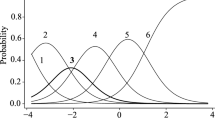Abstract
To develop a simple inventory of maternal rearing attitudes toward preschool children (SMRA), the 50 questions of the revised Taken diagnostic test of the parent-child relationship were restructured in this study. This study consisted of three steps, i.e., (1) restructuring the 50 questions of the revised Taken test, (2) reliability analysis and (3) validity analysis of SMRA.
In the first step, the subjects were 1153 mothers with preschoolers from four to 42 months old. The 50 items were analyzed by principal components (PC) in the factor analysis procedure. As a result, two significant factors emerged. One consisted of six items that indicated “rejection,” while the other consisted of six items that indicated “protection.”
In the second step, the 12 items were analyzed by PC for 89 mothers with preschoolers. As a result, 10 items emerged from the 12 items. Reliability analysis of the two factors was performed by the test-retest method. Both factors showed good a correlation between the test and retest, indicating sufficient reliability for psychological examination of these factors.
In the third step, coefficients of correlation between the two significant SMRA factors and four subscales of MS-form rearing attitude questionnaires were analyzed using Spearman rank order correlation. The subjects were 51 mothers with two-year-old children. One set of SMRA results correlated well with an MS subscale that indicated “rejection,” while the other set of SMRA results correlated well with two MS subscales that indicated “protection.” Therefore, it was confirmed that the SMRA was capable of estimating two maternal rearing attitudes toward preschool children, i.e., “Rejection” and “Dotage.” In addition, the decrease in questions compared to the original Taken test may decrease the burden for subjects.
Similar content being viewed by others
References
Shinagawa F, Shinagawa T. Textbook of “Taken” Diagnostic Test for Parent-child Relationship (Oyako-Kankei-Shindan-Test-no-Tebiki). Nihon-Bunka-Kagakusha: Tokyo, 1958 (in Japanese).
Mishima N, Nishima Y, Hashiguchi E, Ago Y, Nishima S. Application of multivariate analysis to analyze the diagnostic test for parent-child relationship in childhood asthma. Jpn J Psychosomatic Med 1984;24: 281–8 (in Japanese).
Mihara R. Psychosomatic studies on asthmatic children(l), The first report: Rorschach test and “Taken” diagnostic test for child-parent relationship. Jpn J Psychosomatic Med 1984;25: 322–31 (in Japanese).
Ishiyama H. Psychological evaluation of child-parent relationship in children with asthma, renal diseases and severe obesity under institutional therapy. Jpn J Psychosomatic Med 1993;33: 471–9 (in Japanese).
Akasaka T, Shirasaki K, Yamaguchi H, Nakayama T, Shiigai N, Maeda K, Tazoe M. Psychological evaluation of house-tree-family drawings of asthmatic children and parents. Jpn J Psychosomatic Research on Respiratory Diseases 1991;8: 54–8 (in Japanese).
Iwaki Y. Study of infant home environment, a discussion from the view- point of child personality. Hiroshima M J 1990;38: 15–23 (in Japanese).
Kozaki T, Suzuki S, Kojima H. Patients with psychosomatic diseases in childhood and their families. Jpn J Psychosomatic Med 1991;31: 103–8 (in Japanese).
Sakuta T, Saito M, Kanai H. Correlation between maternal attitudes and personality in children aged three years. Psychiatria et Neurologia Paediatrica Japonica 1984;25: 3–9 (in Japanese).
Miyahara T, Kitamura A. Correlation between maternal bringing-up attitudes and the physical development of children. Bull Nara Univ Educ 1993;42 (Nat): 27–36 (in Japanese).
Akasaka T, Maruki K, Suzuki I, Nezu S. Evaluation of “Taken” diagnostic test for child-parents relationship, 1. Re-standardization on the test by the healthy children and their parents. Jpn J Psychosomatic Med 1984;24: 479–86 (in Japanese).
Marija JN. SPSS Professional Statistics TM6.1. SPSS Inc.: Chicago, 1994.
Kleinbaum DG, Kupper LL, Muller KE. Applied regression analysis and other multivariable methods. Duxbury Press: Belmont, 1988.
Nonparametrics and distributions. STATISTICA/Mac. 189–220, StatSoft Inc.: Oklahoma, 1991.
Hirotoshi Y, Matsumoto K, Watanabe J, Sakurai H, Nishimura T. Mother’s attitudes and her children’s development (1). Jpn J Psychosomatic Med 1992;32: 375–81 (in Japanese).
Ushijima Y. Standard Educational Test (Kyoiku-Hyojun-Kensa-Seigi). Kaneko-Shobo: Tokyo, 1961 (in Japanese).
Symonds PM. The Psychology of Parent-child Relationships. Appleton- Century Co.: New York, 1939.
Author information
Authors and Affiliations
Rights and permissions
About this article
Cite this article
Miyahara, T. Development of a simple inventory of maternal rearing attitudes toward their preschool children. Environ Health Prev Med 2, 64–69 (1997). https://doi.org/10.1007/BF02931966
Received:
Accepted:
Issue Date:
DOI: https://doi.org/10.1007/BF02931966




